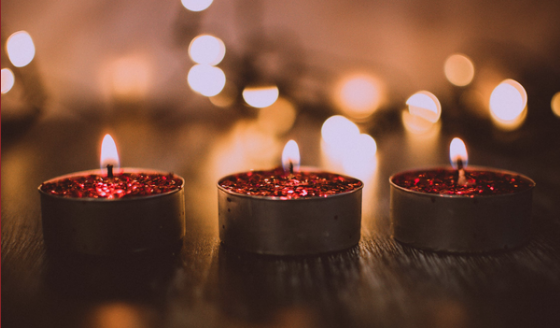
Grief & Loss during the Holidays
by Helen Kim
The trees, lights, and decorations have all gone up extra early this year to help us look forward to a season that traditionally represents cheer and joy. Most of us need all the positivity we can get given the heavy and difficult year we’ve had. However, for many of us, the positive memories around the holidays may conflict with the painful feelings of grief and loss that are often highlighted at this time of the year. This can leave us feeling confused, angry, and even guilty for not aligning ourselves with the festivities of the holidays that surround us.
Not only are we holding onto the grief of COVID-19, but many of us are holding onto the grief of loved ones we have lost. As someone who has lost an immediate family member around the holidays, there are many moments where I am mentally and physically triggered by things that bring me back to the time the loss occurred. The changing of the weather and seasons, a specific place, even certain smells can trigger our grief and bring us to a place of anxiety and uncertainty. Our home may feel extra empty with the loss of loved ones. The sound of the voice that we were so used to hearing in the home is no longer present. The distinct smell of them is faint and lost. Being unable to make sense of it all can leave us feeling debilitated and lost during this time. But, one thing that isn’t lost and that can’t be taken away is the way they made us feel. Maya Angelou once said, “I’ve learned that people will forget what you said, people will forget what you did, but people will never forget how you made them feel.” These feelings about the ones we have lost can be either positive, or painful, or both, depending on the relationship we once had with them.
While grief is an experience universal to the human race, grief is also complex and multilayered. Grief is unique and personal. Even as I share these thoughts on grief, my own personal experience with grief will not be exactly the same as yours. I will never fully fathom the depths of pain you may be holding onto right now. Your grief is your own personal and unique journey.
Whether the death of a loved one occured recently, or sometime in the distant past, the magnitude of your emotions will vary year to year as grief continues to impact and intersect with your life now. And with the passage of time often comes the expectations of others that we will be at a “certain place” in our grief journey after “enough” time has passed. You know that scene from the movie Shrek, where Shrek explains to Donkey how ogres are like onions with multiple layers? He says, “There are a lot more to ogres than people think.” The same is true for grief. There is a lot more to grief than people think. Grief is like an onion with layers upon layers that does not have a concrete finale. Death is final, while grief is not. Grief does not have a clear beginning or an end. It is complex and messy; an ongoing journey without a clear destination. For this reason, it is important to see grief through a lens of tenderness and curiosity, because we never know what layer of grief might be needing our attention and care.
Here are some ways to help you navigate through grief during this holiday season:
- Get curious. What emotions are coming up for you during this particular time? Is it feelings of anger that a loved one is not with you to share the holidays together? Is it deep sadness as you’re wondering what your relationship could have been if he/she was still here? No matter what feelings come up for you, it’s important to give these surfacing emotions the time and attention they need. They are coming up for a reason. We may want to run away from the pain or try our best to numb it out because it just feels so overwhelming. But the more we try to escape or numb our pain, the heavier and more burdensome our unprocessed grief will start to feel. And if you’re not ready to explore whatever emotion might be coming up for you, that’s okay. Just be aware of what your mind and body is wanting to do, and look at it from a place of curiosity rather than judgment. Once we start to judge ourselves on how we’re responding to our grief, this can spiral us to places of guilt and shame. We may just be trying to protect ourselves from being too overwhelmed. When we recognize that our bodies and minds are trying to help us process our grief in various ways, we can slowly start to turn towards grief and notice what is coming up for us.
- Pay attention to your needs. It can feel overwhelming when we allow ourselves to feel the flood of all sorts of emotions. Recognize when you need to take a break. Take a walk, color, or turn on your favorite music and dance. Walking is a repetitive movement involving both the left and right feet. Physiologically, walking offers a form of bilateral stimulation that helps to balance your left and right brain activity, subsequently helping you to regulate your emotions.
- Have a support system. This is easier said than done. Because of the complex and unique nature of grief, you may want to stay in isolation. It may be difficult to reach out to people during this time because you don’t know if your feelings will overwhelm them, or you fear that what they may say won’t be helpful. You may not even know what exactly you need from others around you or what you need to hear the most. Start there. Be honest and let them know where you are in your grief process. The important part is not to stay isolated, and remembering that you don’t have to do this alone.
- Talk to a trained mental health professional. There may be some deep and unprocessed issues that you’re needing to sort through. Sometimes it’s hard to sort through these things on your own or with family and friends. If you’re needing additional support, I highly recommend seeking out a therapist to help you. Therapists are trained to help you understand and discover the many layers that may be buried deep within, helping you to better move forward with your life.
